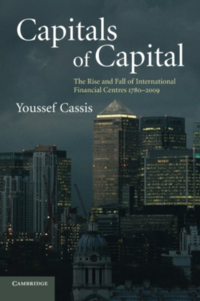Professor Youssef Cassis
Youssef Cassis is Professor of Economic History, Emeritus, at the European University Institute, in Florence. His work mainly focuses on banking and financial history, as well as business history more generally. His most recent publications include Capitals of Capital. A History of International Financial Centres, 1780-2005, (Cambridge University Press, 2006, 2nd revised edition, 2009), Crises and Opportunities. The Shaping of Modern Finance (Oxford University Press, 2011), and, with Philip Cottrell, Private Banking in Europe: Rise, Retreat and Resurgence (Oxford University Press, 2015). He has also recently co-edited The Oxford Handbook of Banking and Financial History, (Oxford University Press, 2016, with Richard Grossman and Catherine Schenk); International Financial Centres after the Global Financial Crisis and Brexit (Oxford University Press, 2018, with Dariusz Wojcik); and Financial Elites and European Banking: Historical Perspectives (Oxford University Press, 2018, with Giuseppe Telesca). He was the co-founder/editor, in 1994, of Financial History Review (Cambridge University Press). He was a long serving member of the Academic Advisory Council of the European Association for Banking and Financial History (EBHA) and past President (2005-2007) of the European Business History Association.
- Business History
- Financial History
- Comparative European History
I retired as Professor of Economic History at the European University Institute, in Florence, in September 2019. I was previously Professor of Economic and Social history at the University of Geneva (2004-2011), and Professor of Global Economic History at the University Pierre Mendes France in Grenoble. My work mainly focuses on banking and financial history, as well as business history more generally. My doctoral dissertation on financial elite in Edwardian England was published in 1994 by Cambridge University Press under the title City Bankers, 18901914, having previously been published in French. I subsequently worked, from a comparative perspective, on the world of big business in Britain, France and Germany in the twentieth century. The results of this study were published in 1997 by Oxford University Press under the title Big Business. The European Experience in the Twentieth Century. My most recent publications include Capitals of Capital. A History of International Financial Centres, 1780-2005 (Cambridge University Press, 2006, 2nd revised edition, 2009), Crises and Opportunities. The Shaping of Modern Finance (Oxford University Press, 2011), and, with Philip Cottrell, Private Banking in Europe: Rise, Retreat and Resurgence (Oxford University Press, 2015). I have also recently co-edited The Oxford Handbook of Banking and Financial History (Oxford University Press, 2016, with Richard Grossman and Catherine Schenk); International Financial Centres after the Global Financial Crisis and Brexit (Oxford University Press, 2018, with Dariusz Wojcik); and Financial Elites and European Banking: Historical Perspectives (Oxford University Press, 2018, with Giuseppe Telesca). In 1994, I co-founded, with Philip Cottrell, Financial History Review (Cambridge University Press) and co-edited it until 2005. I was a long serving member of the Academic Advisory Council of the European Association for Banking and Financial History (EBHA) and past President (2005-2007) of the European Business History Association. I am currently engaged in a research project on ‘The Memory of Financial Crises’.

Capitals of Capital: A History of International Financial Centres 1780–2005 (Cambridge University Press, 2012)
International financial centres have come to represent a major economic stake. Yet no historical study has been devoted to them. Professor Cassis, a leading financial historian, attempts to fill this gap by providing a comparative history of the most important centres that constitute the capitals of capital - New York, London, Frankfurt, Paris, Zurich, Amsterdam, Tokyo, Hong Kong, Singapore - from the beginning of the industrial age up to the present. The book has been conceived as a reflection on the dynamics of the rise and decline of international financial centres, setting them in their economic, political, social, and cultural context. While rooted in a strong and lively historical narrative, it draws on the concepts of financial economics in its analysis of events. It should widely appeal to business and finance professionals as well as to scholars and students in financial and economic history.




